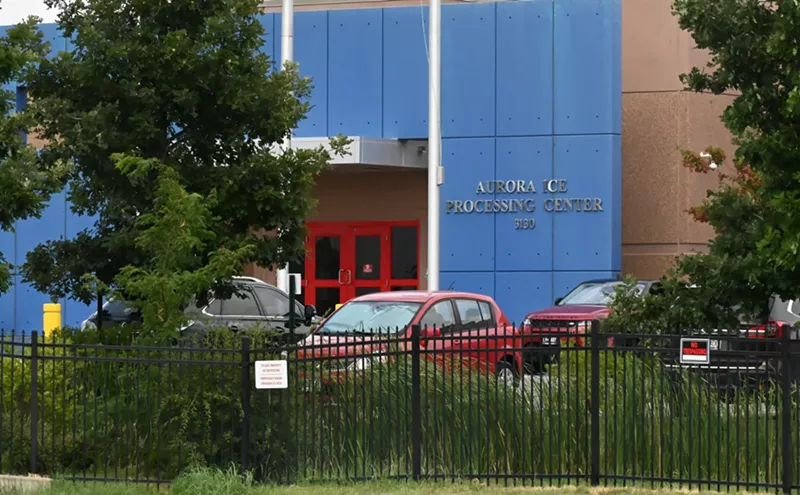In years to come, historians may look at what happened last night as an important step in that direction. The Republican-controlled U.S. House of Representatives voted to defund DEA medical marijuana raids in states, including Colorado, where MMJ is legal.
The vote came in conjunction with H.R. 4660, a massive appropriations bill for "the Departments of Commerce, Justice, Science and Related Agencies for the fiscal year ending September 15, 2015," according to the version of the bill on view below.
Representative Dana Rohrabacher, a California Republican, proposed an amendment to the measure that reads like so:AMENDMENT TO H.R. 4660, AS REPORTED (CJS APPROPRIATIONS) OFFERED BY MR. ROHRABACHER OF CALIFORNIAOther measures like this one have been introduced in the past, but none have ever gotten close to passage. According to the Marijuana Majority's Tom Angell, the previous high-water mark was 165 votes in favor way back in 2007.At the end of the bill (before the short title), insert the following:
SEC. ll. None of the funds made available in this Act to the Department of Justice may be used, with respect to the States of Alabama, Alaska, Arizona, California, Colorado, Connecticut, Delaware, District of Columbia, Florida, Hawaii, Illinois, Iowa, Kentucky, Maine, Maryland, Massachusetts, Michigan, Minnesota, Mississippi, Missouri, Montana, Nevada, New Hampshire, New Jersey, New Mexico, Oregon, Rhode Island, South Carolina, Tennessee, Utah, Vermont, Washington, and Wisconsin, to prevent such States from implementing their own State laws that authorize the use, distribution, possession, or cultivation of medical marijuana.
This time around, however, the House passed the amendment 219 to 189 -- a margin that leaves Angell happily startled, as is clear in an e-mail statement to Westword shared late last night.
"This historic vote shows just how quickly marijuana reform has become a mainstream issue," Angell writes. "The last time a similar amendment came up it didn't come very close to passing but, since then, more states have passed medical marijuana laws and a couple have even legalized marijuana for all adults. More states are on the way later this year and in 2016, and it's clear that more politicians are beginning to realize that the American people want the federal government to stop standing in the way. If any political observers weren't aware that the end of the war on marijuana is nearing, they just found out."
One factor for increasing support cited by Angell: the attention garnered by parents of children using low THC/high CBD forms of marijuana to treat children suffering from severe seizure disorders. Last year, as we've reported, Charlotte Figi, a Colorado child diagnosed with Dravet Syndrome, an uncommon, and serious, form of epilepsy, became a poster child for this movement when CNN's Sanjay Gupta featured her story in reports about how he changed his mind about the medical efficacy of cannabis. Since then, an increasing number of families whose children are afflicted with similar conditions have moved to Colorado in order to gain access to this treatment."This year's huge vote increase can largely be attributed to the fact that lawmakers only recently began hearing the moving stories of the many children whose severe seizures are only relieved by marijuana," Angell notes. "Being able to list these CBD states in the amendment text meant that more members of Congress that represent these states voted yes than otherwise would have. Counting these states, 60 percent of the U.S. population lives in a place where state law disagrees with federal law."
Other advocates are similarly jazzed by last night's vote.
Continue for more about last night's historic vote, including an original document and a video. Here's a statement from the Marijuana Policy Project's Dan Riffle, whose organization began lobbying for an amendment like Rohrabacher's back in 2003:"Congress is officially pulling out of the war on medical marijuana patients and providers. Federal tax dollars will no longer be wasted arresting seriously ill medical marijuana patients and those who provide to them. This is a historic vote, and it's yet another sign that our federal government is shifting toward a more sensible marijuana policy.Also weighing in is Neill Franklin, head of Law Enforcement Against Prohibition. "Today marks the beginning of a new era in marijuana policy reform," he writes. "Never before has the US Congress acted so decisively to protect states' rights to make their only laws regarding marijuana. This is an encouraging sign of things to come and represents a return to the constitutional principle of respecting states' rights to police their own people.""This measure passed because it received more support from Republicans than ever before. It is refreshing to see conservatives in Congress sticking to their conservative principles when it comes to marijuana policy. Republicans increasingly recognize that marijuana prohibition is a failed Big Government program that infringes on states' rights.
"It's becoming clearer and clearer that marijuana prohibition's days are numbered. Polls are consistently finding that a strong majority of Americans think marijuana should be legal, and an overwhelming majority support legal access to medical marijuana. It's nice to see more members of Congress standing up for their constituents instead of standing in the way of reform."
It's important to stress that the language of Rohrabacher's amendment specifically cites medical marijuana, not recreational pot -- meaning, presumably, that the federal government could continue to fund enforcement of actions related to non-medical cannabis in Colorado and Washington, the two states that have legalized limited sales of the substance for recreational purposes. Moreover, the vote isn't the final word on the subject. A long process remains before it can possibly be signed into law.
As such, the vote does not yet qualify as a tipping point. Rather, it's an indication that the balance continues to shift.
Here's the text for the most recent published version of H.R. 4660, followed by a C-SPAN video of Rohrabacher talking about medical marijuana during a House speech earlier this month.
Send your story tips to the author, Michael Roberts.
More from our Marijuana archive circa December 2013: "Marijuana: California advocates consider best ways to follow Colorado's legalization lead."












